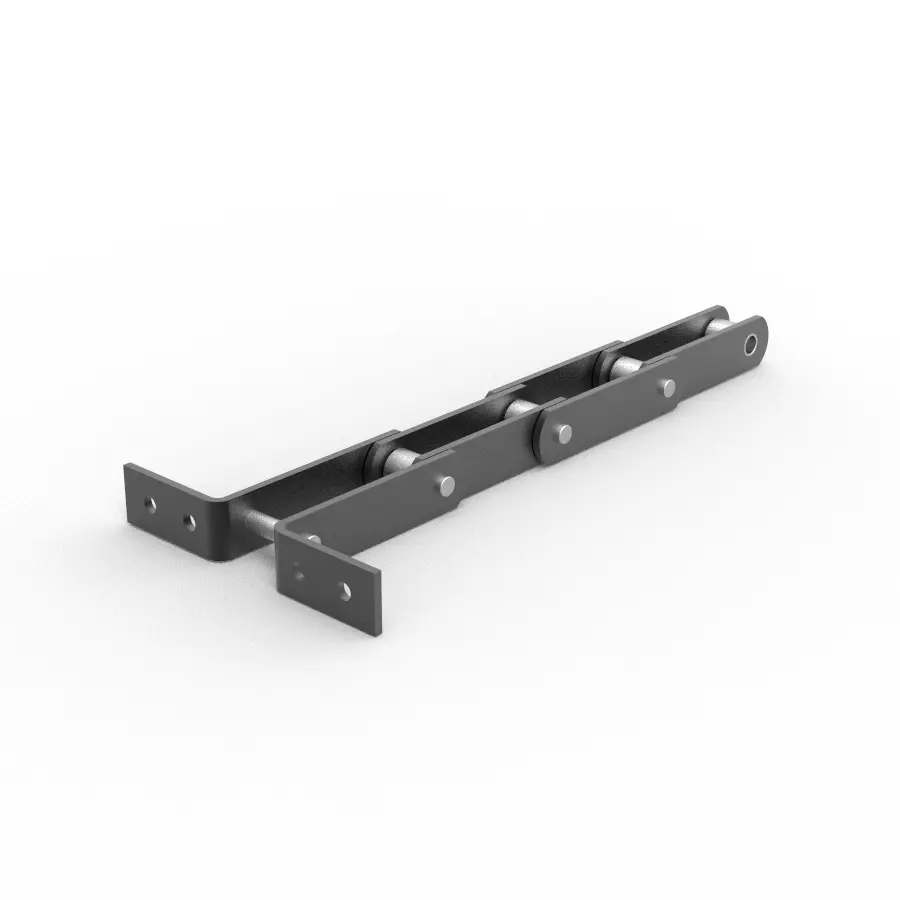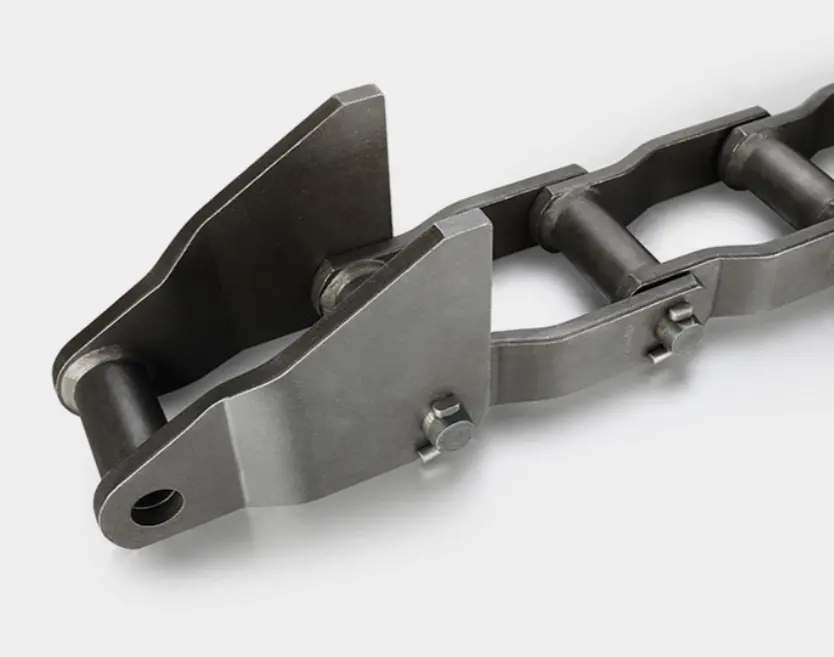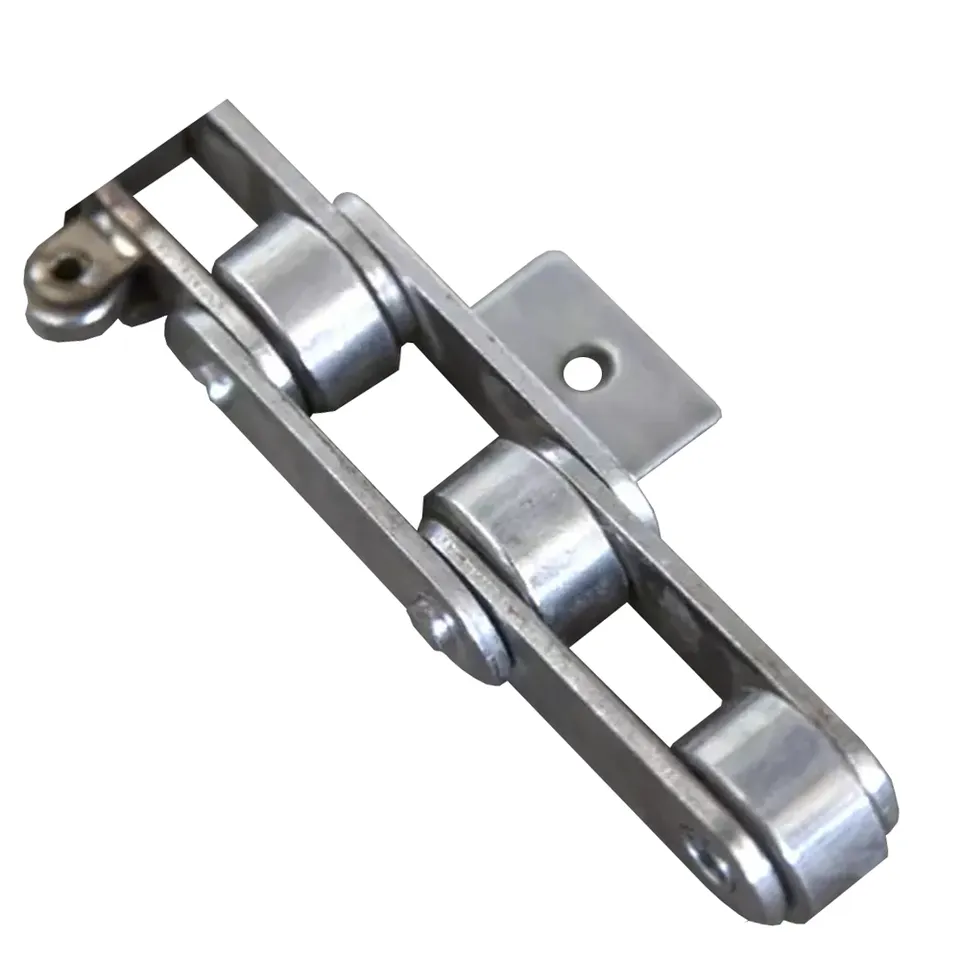Product Description
CZPT rollers enhance rotation on the bushing while reducing impact loads on the sprocket tooth during operation.
All components are heat treated to achieve maximum strength.
Pre-loaded during the manufacturing process to minimize initial elongation.
Hot dipped lubrication ensures 100% lubrication of all chain components to extend wear life and reduce maintenance costs.
| CHAIN NO. |
PITCH | BUSH WIDTH |
ROLLER DIA |
PIN | PLATE | MIN. TENSILE STRENGTH |
MAX. TENSILE STRENGTH |
WEIGHT | |||||||
| d | L1 | L2 | H | t/T | |||||||||||
| mm | mm | mm | mm | mm | mm | mm | mm | KN/min | KN/min | kg/m | |||||
| US101.6 | 101.60 | 31.80 | 57.15 | 15.88 | 34.40 | 38.40 | 38.10 | 6.40 | 72.3 | 8.20 | 11.67 | ||||
| P101.6-R47 | 101.60 | 30.00 | 47.00 | 15.88 | 41.00 | 45.00 | 41.00 | 10.00 | 242.0 | 19.40 | 17.98 | ||||
| US127 | 127.00 | 38.40 | 69.85 | 19.00 | 45.10 | 51.40 | 50.80 | 9.60 | 180.0 | 20.30 | 19.22 | ||||
| P152.4-R66.7 | 152.40 | 30.00 | 66.70 | 26.92 | 35.50 | 41.50 | 50.80 | 8.00 | 167.0 | 13.40 | 16.11 | ||||
| C9060 | 152.40 | 37.70 | 69.85 | 18.90 | 45.00 | 49.30 | 50.80 | 9.50 | 250.0 | 28.20 | 17.20 | ||||
| C 0571 1 | 152.40 | 37.70 | 69.85 | 18.90 | 44.90 | 50.30 | 57.20 | 9.50 | 377.9 | 28.20 | 18.74 | ||||
| C 0571 3 | 152.40 | 38.00 | 76.20 | 23.83 | 47.10 | 54.90 | 61.90 | 10.30 | 635.0 | 36.10 | 22.27 | ||||
| 1796 | 152.40 | 37.80 | 69.85 | 76.20 | 73.00 | 22.23 | 43.90 | 53.20 | 57.20 | 9.50 | 444.5 | 33.30 | 18.50 | 19.50 | 19.20 |
| Usage: | Transmission Chain, Conveyor Chain, Dedicated Special Chain, Roller Chain |
|---|---|
| Material: | Alloy/Carbon Steel |
| Surface Treatment: | Polishing |
| Feature: | Heat Resistant |
| Chain Size: | 4"*6" |
| Structure: | Roller Chain |
| Samples: |
US$ 10/Meter
1 Meter(Min.Order) | |
|---|
| Customization: |
Available
| Customized Request |
|---|

Can mill chains be used in wastewater treatment and sewage systems?
Yes, mill chains can be used in wastewater treatment and sewage systems for various applications. These chains offer specific advantages that make them suitable for such environments, where exposure to corrosive and abrasive materials is common. Here are some key points regarding the use of mill chains in wastewater treatment and sewage systems:
1. Corrosion Resistance: Wastewater and sewage often contain corrosive substances, such as acids and chemicals. Stainless steel mill chains are particularly beneficial in these environments due to their corrosion resistance, which helps to prevent premature wear and elongation of the chain.
2. Abrasion Resistance: Mill chains are designed to handle heavy loads and resist wear and abrasion, making them suitable for applications where wastewater may contain abrasive particles, sediment, or sludge.
3. Reliability: In wastewater treatment and sewage systems, reliability is crucial to maintain smooth operations. Mill chains, when properly selected and maintained, provide reliable performance and minimize downtime.
4. High Strength: Mill chains are capable of handling heavy loads and high-capacity material transfer, making them suitable for wastewater treatment processes that involve moving large volumes of liquid or solid materials.
5. Easy Maintenance: Stainless steel mill chains require minimal maintenance, which is beneficial in wastewater treatment facilities where regular maintenance can be challenging due to the nature of the environment.
6. Resistance to Harsh Chemicals: Wastewater treatment processes often involve the use of various chemicals for treatment and purification. Stainless steel mill chains can withstand exposure to these chemicals without deteriorating or compromising their performance.
7. Extended Service Life: Due to their corrosion and abrasion resistance, mill chains can have a longer service life in wastewater treatment and sewage systems compared to conventional carbon steel chains.
8. Versatility: Mill chains come in various configurations, including standard, double pitch, and heavy-duty options, allowing for versatility in designing wastewater treatment systems to meet specific requirements.
Overall, mill chains, especially those made of stainless steel, are a reliable and durable option for use in wastewater treatment and sewage systems. Their corrosion and abrasion resistance, high strength, and low maintenance make them well-suited for handling the challenging conditions and materials encountered in these applications.

How do mill chains handle the transfer of materials in different physical forms?
Mill chains are designed to handle the transfer of materials in various physical forms, including bulk solids, powders, granules, and even liquids, depending on the specific application. Their robust construction and flexible design make them suitable for accommodating different material properties and forms. Here’s how mill chains handle the transfer of materials in various physical forms:
- Bulk Solids: For handling bulk solids, mill chains are equipped with attachments or flights that create a continuous conveying surface. The material is moved along the chain through the frictional force between the material and the chain’s conveying surface.
- Powders and Granules: When dealing with powdery or granular materials, mill chains may have special attachments, buckets, or pans to prevent material spillage during transfer. The chain’s design ensures that the powdery or granular materials remain contained and do not disperse during conveying.
- Liquids: Mill chains can also handle liquid materials, typically by incorporating troughs or channels in their design. The liquid material is contained within these troughs and transported along the chain to its destination.
- Viscous Materials: In the case of highly viscous materials, mill chains with scraper attachments may be used to prevent material buildup and ensure smooth transfer.
- Heat-Sensitive Materials: Some mill chains are designed to handle heat-sensitive materials by using heat-resistant materials or incorporating cooling mechanisms to prevent material degradation.
Proper chain selection is crucial to match the material’s characteristics and transfer requirements. The chain’s pitch, width, and material of construction are factors that affect its handling capability. Additionally, regular maintenance and inspection of the mill chains are essential to ensure their efficiency and reliability in handling materials of different physical forms.

What are the advantages of using a mill chain in material handling systems?
Mill chains offer several advantages when used in material handling systems, especially in heavy-duty industrial applications. Here are some key benefits:
1. High Load Capacity: Mill chains are designed to handle heavy loads and provide high tensile strength. They are capable of transporting large and bulky materials, making them ideal for industries that deal with heavy products like steel, lumber, and mining.
2. Durability and Longevity: Mill chains are constructed from high-quality materials, such as carbon steel or stainless steel, which enhances their durability and resistance to wear and corrosion. This ensures a long service life and reduces the need for frequent replacements, resulting in cost savings over time.
3. Precision and Control: With various attachment options available, mill chains offer precise and controlled material handling. This is particularly important in industrial processes where accurate positioning and control of materials are essential for the overall efficiency and safety of the operation.
4. Versatility: Mill chains can be customized to suit different applications and environments. They are available in various sizes and configurations, allowing them to be adapted to specific material handling needs in different industries.
5. Resistance to Harsh Environments: In industries like steel production, mining, and lumber handling, the working conditions can be harsh, with exposure to dust, moisture, and high temperatures. Mill chains are designed to withstand these challenging environments, ensuring reliable performance even in adverse conditions.
6. Low Maintenance: Due to their robust construction and high-quality materials, mill chains require minimal maintenance. Regular lubrication and periodic inspections are typically sufficient to keep them in good working condition, reducing downtime and maintenance costs.
7. Cost-Effective: Despite their initial investment, mill chains offer long-term cost-effectiveness due to their extended service life and reduced need for frequent replacements or repairs.
Overall, the use of mill chains in material handling systems brings improved efficiency, reliability, and safety to industrial processes. Their ability to handle heavy loads and withstand harsh conditions makes them a valuable asset in various industries, contributing to smoother and more productive material handling operations.


editor by CX 2023-08-16